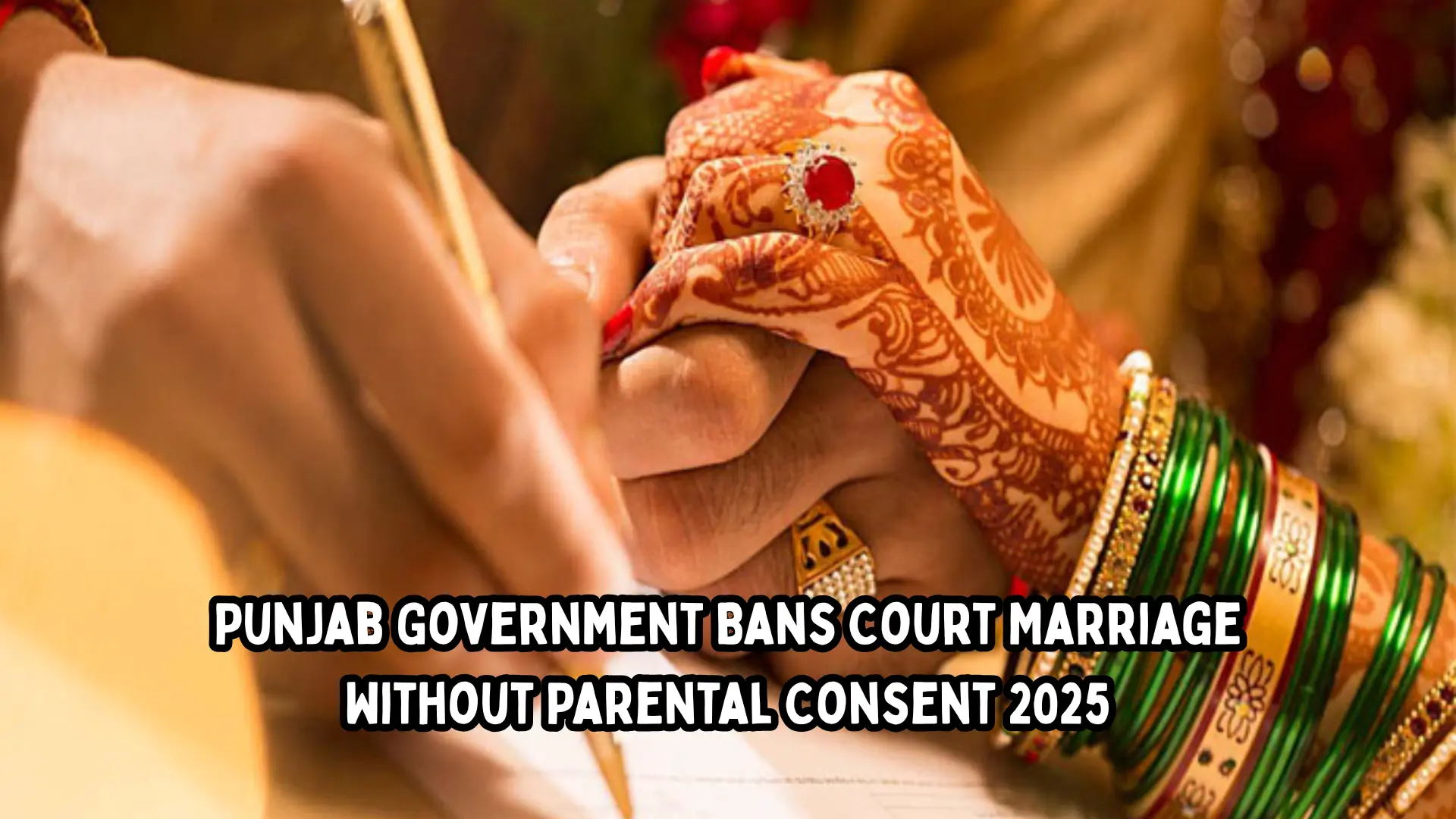Punjab Government Bans Court Marriage Without Parental Consent 2025. The Punjab Government, under the leadership of Chief Minister Maryam Nawaz Sharif, has announced a significant social reform court marriages (Nikah) without parental consent will no longer be accepted in the province.
The decision, which gained massive public attention, is presented as a step toward protecting family rights, ensuring social harmony, and safeguarding women from fraudulent or forced relationships.
According to the official notice shared by the Punjab Department of Education, this decision reflects the government’s commitment to restoring family respect and societal values, particularly in cases where young people marry secretly without the knowledge or approval of their parents.
Background of the Decision
In recent years, Punjab has witnessed a sharp rise in court marriages — many involving young couples marrying without informing their families. Some of these unions led to legal disputes, social conflicts, and family breakups, while others involved fake marriages or false claims made for financial or personal gain.
To address this growing problem, the Punjab government decided to tighten legal procedures for court marriages, ensuring that both parents’ and guardians’ consent are properly verified before the marriage is legally registered.
The announcement reads:
“Now, no fake or unverified marriage of a respectable family’s daughter will be accepted. Without the presence or consent of parents, court marriage (Nikah) will not be considered valid.”
Role of Chief Minister Maryam Nawaz Sharif
Chief Minister Maryam Nawaz Sharif has been actively promoting reforms aimed at protecting women’s dignity, ensuring education, and promoting responsible social conduct. Her recent decision to ban court marriages without parental involvement reinforces her vision of a more disciplined, family-centered society in Punjab.
She stated that parents play a vital role in their children’s major life decisions, and marriage — being a sacred institution — must not be conducted in secrecy or without proper guardianship.
Key Highlights of the Announcement
| Aspect | Details |
|---|---|
| Decision Approved By | Chief Minister Maryam Nawaz Sharif |
| Announced By | Punjab Education Department (Official) |
| Key Point | Court marriages without parents’ or guardians’ consent will no longer be accepted |
| Purpose | Protecting family integrity, preventing fake marriages |
| Applies To | All citizens residing in Punjab |
| Religious Context | The decision aligns with Islamic teachings about the importance of wali (guardian) in marriage |
Legal and Religious Context
Under Islamic law, a wali (guardian, usually a father or close male relative) is required for a woman’s marriage to be valid. However, in previous years, some couples used the court system to bypass parental approval, claiming independent consent under civil law.
The new provincial stance seeks to eliminate this loophole. The government argues that it is not against personal freedom, but rather ensures that all marriages are legitimate, transparent, and socially accepted.
Religious scholars in Punjab have also praised the move, emphasizing that Islam values parental guidance and family consultation in marriage decisions.
Government Statement
According to the official statement shared by the Punjab Education Department (Official):
“No fake marriage or false registration of a respectable family’s daughter will be tolerated. Any marriage conducted without parental consent will be legally challenged and declared invalid.”
This marks a clear policy shift — from individual-based decisions to family-involved approvals.
Reaction from the Public
The announcement has generated mixed reactions across Punjab and on social media:
- Supporters argue that the decision will protect women and families from deceitful marriages, strengthen social harmony, and align with cultural values.
- Critics believe it limits individual freedom and may be misused to suppress consensual marriages among adults.
Despite differing opinions, the move reflects the provincial government’s focus on moral and social order, especially after increasing reports of fake marriage certificates and court abuse in recent years.
Implementation Plan
The new ruling will be implemented in coordination with:
- Family courts and Nikah registrars across Punjab
- Police and administrative departments for verification of parental consent
- District education and social welfare offices for community awareness
Verification Process
- Identification Check: Both bride and groom must submit valid CNICs.
- Parental Presence or Written Consent: At least one parent or guardian must verify the marriage before the registrar.
- Court Approval: Judges will verify that no fraud, coercion, or misrepresentation exists.
- Record Maintenance: All verified marriages will be recorded in the Provincial Marriage Registry Database.
Objectives of the New Law
The Punjab government listed several goals behind this reform:
- Prevent Fake Marriages: Stop misuse of fake court certificates.
- Protect Family Honor: Ensure marriages are legitimate and transparent.
- Reduce Social Conflicts: Avoid disputes between families and communities.
- Uphold Religious Values: Align marriage procedures with Islamic principles.
- Empower Women Legally: Prevent exploitation through fake relationships or fraud.
Potential Impact on Society
This policy will likely reshape how marriage laws are viewed and practiced in Punjab. It strengthens family structure while reducing the number of fraudulent or forced marriages.
However, some legal experts argue that it may require clear judicial guidelines to prevent misuse against genuine adult couples. Balancing family consent with individual rights will remain a key challenge for the government.
Public Awareness Campaign
The Punjab Information Department and Education Ministry are expected to launch an awareness campaign soon to educate citizens about the new rules. Pamphlets, social media posts, and school-level awareness sessions will highlight the importance of involving parents in marriage decisions.
Conclusion
The Punjab Government’s decision to invalidate court marriages without parents’ consent marks a major step toward preserving family values and preventing marriage fraud. Chief Minister Maryam Nawaz Sharif’s leadership has once again sparked discussion about the balance between individual freedom and traditional values.
While some see it as a restriction, others view it as a protective measure for women’s dignity and family honor. As the ordinance takes effect, its success will depend on fair implementation and public cooperation to ensure that marriage remains a respected, transparent, and lawful institution in Punjab.














